Introduction
If you’re one of those people who can’t sleep good at night, you might have thinked already about trying something natural. Many people around the world is asking the same question: what helps more with sleep — Magnesium vs. Melatonin? Both of these are well-known as natural remedies for improving sleep quality. But they works different in your body and got different effects.
In this guide, we going to compare Magnesium vs. Melatonin in details. You’ll learn how each one works, when to use them, what the side effects is, and who should take what. Whether you struggle falling asleep or staying asleep, this comparison will help you choosing the right one for better rest.
What Is Magnesium?
Magnesium are one of the most important minerals that your body need to function properly. It do many things — like help your muscles to work better, help with nerve signals, and make energy so you don’t feel tired. But what lot of people don’t know is how magnesium can affect sleep too.
When comparing Magnesium vs. Melatonin, it’s important to understand how magnesium works inside your body. It helps you relax by working with something called neurotransmitters, like GABA, which calm your brain down. That’s why when you take magnesium before bed, it can make you feel more sleepy and less stressed out.
People who don’t have enough magnesium sometimes feel nervous or wake up many times at night. Researchs show that magnesium helps people sleep longer and better. It even reduce cortisol, the stress hormone, so your body can finally relax and rest more deep.
Many doctors say magnesium is a natural way to help with sleep problems, especially when stress or muscle tension is part of it. So when thinking about Magnesium vs. Melatonin, magnesium is not just a supplement, it’s a calming support for both body and brain.
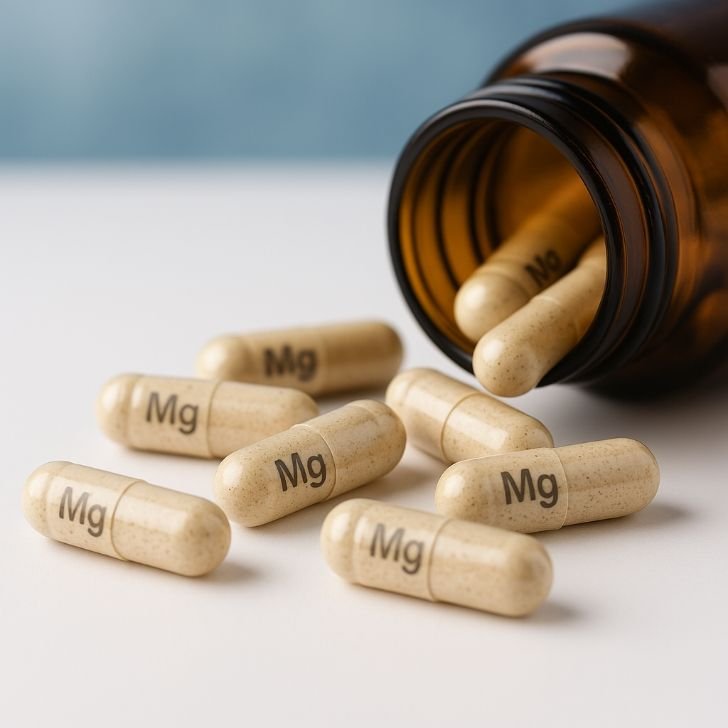
Benefits of Magnesium for Sleep:
There are many good benefits that come from using magnesium for sleep. In the Magnesium vs. Melatonin debate, magnesium stand out because it do more than just help you fall asleep—it also improve how deep and relaxing your sleep feels.
One of the big ways magnesium helps is by making GABA (a calming brain chemical) work more better. This GABA helps turn off your brain’s stress and makes it easier to get sleepy. When GABA working well, your brain stop racing at night and lets you rest.
Also, magnesium help lower cortisol, which is a hormone that makes your body feel alert and stressed. High cortisol at night make it hard to sleep, so magnesium work like a brake pedal for your mind and body.
Another thing is, magnesium help your muscles not feel tight. It makes your body feel loose and ready to rest, like when you finish stretching after a long day. Many people with muscle pain or tension sleep better after using magnesium before bed.
So, to sum up, here are what magnesium can do for sleep:
Help your brain relax with GABA
Lower the stress hormone cortisol
Calm your muscles
Put your body in a sleepy mood
That’s why in many Magnesium vs. Melatonin comparisons, magnesium is seen as more natural and helpful if sleep quality is your main goal—not just falling asleep faster.
👉 Check magnesium sleep aid on Amazon 🛒 Shop Now
What Is Melatonin?
Melatonin is not a mineral like magnesium, it’s actually a hormone. Your body make melatonin on it’s own when the sun goes down and it gets dark. That’s why people sometimes call it the “sleep hormone”.
In the Magnesium vs. Melatonin discussion, melatonin plays a more direct role in controlling your body’s clock. When it gets dark, your brain gets signal from melatonin that say “hey, it’s time for bed now.” But if you have bright lights, or use phone before sleeping, your body might not make enough melatonin.
Melatonin is also different from magnesium because it don’t relax your muscles or calm down your nerves. Instead, it’s job is mostly to tell your brain what time it is for sleep.
Sometimes, your melatonin cycle gets messed up. Like if you travel across timezones, or you work night shifts, or you sleep at weird hours. That’s when taking melatonin supplement might help fix that timing problem.
But remember, melatonin not always the answer for all sleep problems. It don’t always make your sleep quality better, but just help you fall asleep quicker. That’s why in Magnesium vs. Melatonin, many experts say melatonin good for jet lag and schedule changes, but magnesium is better for deep and calm sleep.
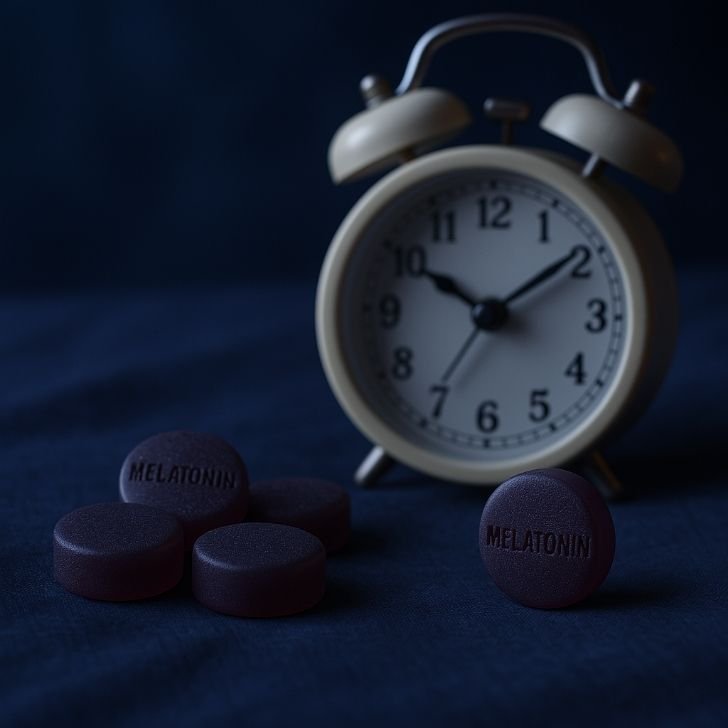
Melatonin and Sleep
One of the most known melatonin benefits is that it help people fall asleep more faster, especially if they got trouble falling asleep at regular time. It’s also really useful for peoples who travel between time zones or got irregular sleep habits.
Unlike magnesium, melatonin don’t work on your nervous system or muscles. It won’t help much with calming anxiety or relaxing your body. That’s why when people ask about Magnesium vs. Melatonin, it’s important to understand their jobs is very different.
Melatonin just helps your brain know when to start sleeping. But it not necessarily make the sleep deeper or longer. Some people even say they fall asleep fast but still wake up feeling tired because their sleep wasn’t so restful. That’s where magnesium maybe works better, because it calms the body and supports quality sleep.
So if you go to bed late, or find it hard to sleep after a trip or late work shift, melatonin might help. But if you already fall asleep okay but want better sleep quality, then magnesium maybe the better option in the Magnesium vs. Melatonin debate.
Benefits of Melatonin:
The melatonin benefits is very well-known by peoples who struggle with falling asleep on time. One of the main thing it does is helping control your body’s sleep clock, which is called the circadian rhythm. That’s like your body’s inner timer that tells you when to sleep and wake up.
Melatonin is also helpful if you got jet lag, especially when you travel from one country to other and your sleep schedule gets messed up. It tells your brain that it’s nighttime, even if the sun is still up in your new place.
Many night shift workers use melatonin to help them fall asleep when they come back home in the morning. Because for them, the body don’t naturally produce enough melatonin during daytime, so they need a boost.
In the Magnesium vs. Melatonin discussion, this hormone is great when you need to fall asleep faster, but not always great when it comes to improving sleep quality. That’s why peoples often ask if magnesium for sleep is more effective in the long term.
So, to sum it, melatonin:
Help you fall asleep quicker
Assist with jet lag recovery
Supports shift workers
Helps reset your internal clock
> 🛒 Looking for melatonin options? 👉 Check melatonin sleep aid on Amazon
Magnesium vs. Melatonin: A Side-by-Side Comparison
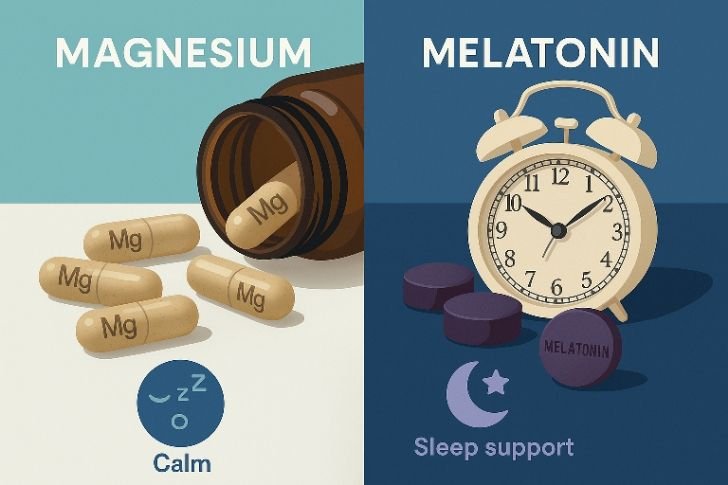
So when we talking about Magnesium vs. Melatonin, it’s important to see how both are different. Magnesium, for starter, it’s a mineral that do many things in body. Melatonin, however, is a hormone that body makes naturally at night time.
The main job of magnesium are to calm your nerves and make your muscles relaxed, which helps with improving sleep quality. Melatonin’s job are a bit different—it works more like a signal to brain that it’s bedtime, helping you fall asleep faster but not really making the sleep deeper.
If you feel stress or got muscle tension before bed, magnesium gonna help more. But if you’re trying to adjust to jet lag or you’re a night worker, melatonin are the better choice.
Side effects are different too. Magnesium don’t cause many problems, but sometimes it makes stomach upset or cause diarrhea if take too much. Melatonin side effects is more about feeling sleepy next day, or having vivid weird dreams that people don’t like.
You can find magnesium in many forms like pills, powders, and even drinks. Melatonin also come in tablets, gummies, or sprays you put under your tongue.
That’s why when choosing between magnesium for sleep or melatonin, it really depends on what is your problem exactly.
Scientific Insights: What Research Says
When looking at science and studies, we can better understand Magnesium vs. Melatonin and how they works for improving sleep quality.
A study from 2012 said that magnesium helped older peoples to sleep better. They sleeped for longer time, had deeper rest, and even feel more refreshed in morning. The study also show magnesium lowered cortisol hormone—which is known to keep people awake and make sleep hard. So when cortisol goes down, sleep become more easier and peaceful.
Another study find that people who took magnesium before bed reported feeling less anxious, and their muscles was more loose and not tight. This make a big difference for falling into natural sleep state. So in many ways, magnesium for sleep has strong support from science.
But what about melatonin? Well, research on melatonin shows it help people fall asleep more faster, especially if they stay up late or work night shifts. But while melatonin does help start sleep process, many studies don’t show big improvement in sleep quality itself. This means you might fall asleep quicker, but your sleep may not feel very deep or refreshing.
Comparing both, magnesium vs. melatonin, we can say that magnesium might do better in long-term support, while melatonin works more like a quick trigger.
Natural Sleep Supplements: Which One Wins?
When people looking for natural sleep supplements, the question of Magnesium vs. Melatonin comes up always. Both is popular and both can help, but they not work same way.
Magnesium is one of the most good natural supplement for improving sleep quality in long run. It help your body relax, lower stress levels, and make your brain calm before bed. With magnesium, many peoples find that they not just fall asleep, but stay asleep for longer time. If you got stress or feel tense, magnesium for sleep is more better choice.
Melatonin, on other side, is good if you need fast help. Like, if you traveling across time zones, or working late shift, melatonin helps reset your sleep clock quickly. But melatonin should not be taken every single night. Too much can make body confused, and sometimes people feel sleepy in morning or have bad dreams.
So, in the debate of Magnesium vs. Melatonin, magnesium wins for daily support and sleep quality improvement, while melatonin is more better as a short-term helper.
🛒 Try magnesium glycinate for best results – 🔗 See it on Amazon
🛒 Buy melatonin spray – 👉 Check it out here
Who Should Use Magnesium?
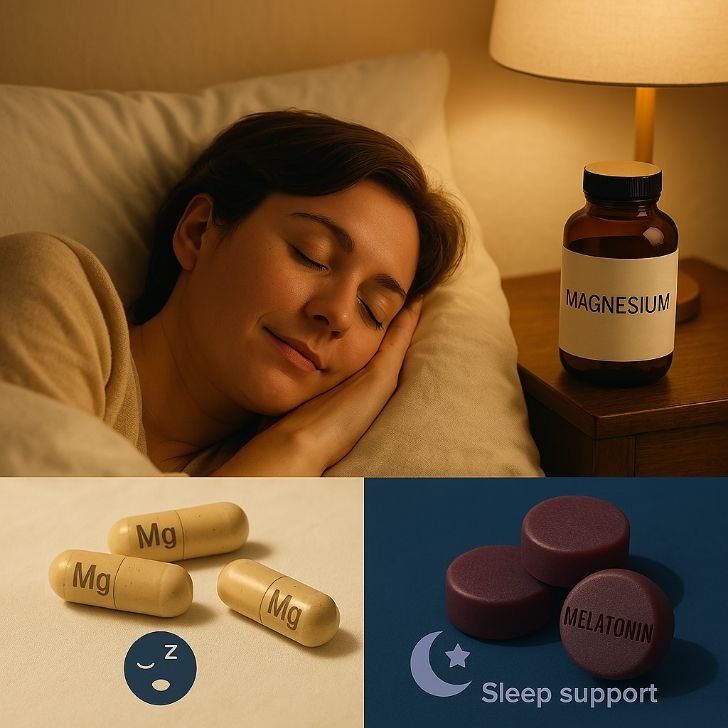
Many people don’t know if magnesium is for them or not. But when we talking about Magnesium vs. Melatonin, it’s important to see who really need magnesium for sleep.
Magnesium works really good for people who wake up in the middle of night and can’t go back to sleep. It also help much with muscle tightness or pains that keep you up. If you feel stress or overthinking before bed, magnesium is maybe the better choice.
Also, some peoples want to take a natural supplement every day without making dependance or bad side effects. In this case, magnesium for sleep is more safe and more good for long term use.
Types of magnesium is not all same. Some are better for sleep:
Magnesium glycinate is easy on stomach and absorbs good.
Magnesium citrate helps digestion and sleep at same time.
If you try to compare Magnesium vs. Melatonin for your daily sleep routine, magnesium gives more calmness, muscle relief, and steady sleeping hours.
Who Should Use Melatonin?

When it come to Magnesium vs. Melatonin, some peoples not sure if melatonin is right for them. But melatonin can be very useful in many situations where your natural sleep cycle is messed up.
For example, melatonin works good if you traveling across different timezones and your brain don’t know when to sleep. It’s also helpful if you working night shifts and sleep in the day instead of night.
Other good time to use melatonin is when you can’t fall asleep at start, but once you sleep, you stay asleep fine. In that case, melatonin can help you begin the sleep easier. It’s not always for deep sleep like magnesium, but it help with sleep timing a lot.
Also, melatonin is good if you only need sleep help for a couple of days and don’t want to use something long-term.
The usual forms of melatonin you will find include:
Tablets from 1mg to 5mg
Sublingual sprays that work fast
Gummies or mixes with herbs like chamomile for calming effect
Comparing Magnesium vs. Melatonin, melatonin is more for timing, while magnesium is for quality. Choose based on your sleep problems.
🔗 👉 Browse melatonin supplements on Amazon and choose what suit your need.
Can You Take Magnesium and Melatonin Together?
A common question people ask when looking at Magnesium vs. Melatonin is, “Can I take them both at the same time?” The answer is yes, it’s mostly safe for many peoples to take magnesium and melatonin together as a sleep combo.
These two works different in the body. Magnesium is relaxing your muscles and calming your nerves so you feel less tension before bed. Melatonin is not doing that, but it telling your brain that it’s time to sleep by matching with the night light cycle. So, together they cover more reason why you can’t sleep.
Many natural supplements on the market already mix both of them, because people need both quality of sleep and faster falling asleep. In Magnesium vs. Melatonin comparison, combining them give you a more complete help with sleep.
Still, it’s always smart to talk to your doctor before trying them together, especially if you taking other meds or have health issues. You also want to start with low doses and see how your body react.
🛒 You can find good sleep combos that include Magnesium + Melatonin in one pill or gummy.
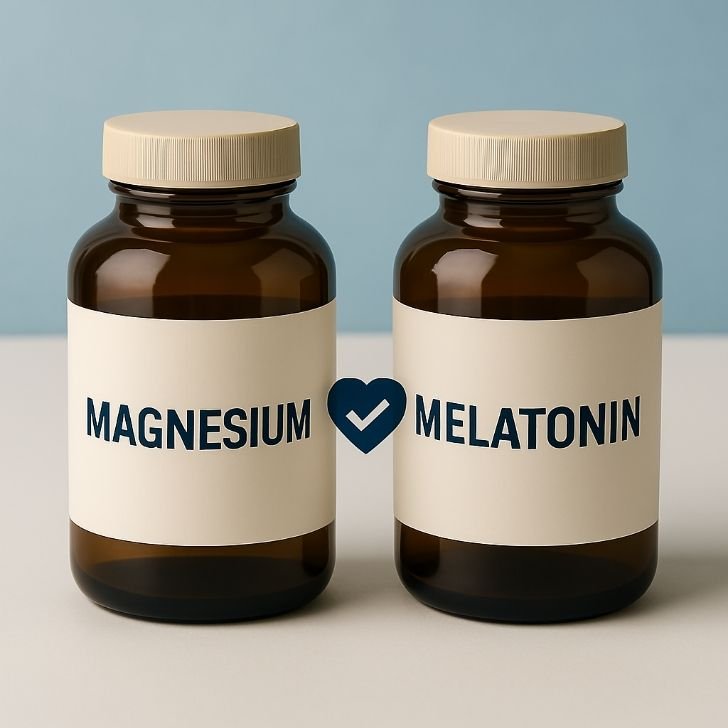
Safety and Side Effects
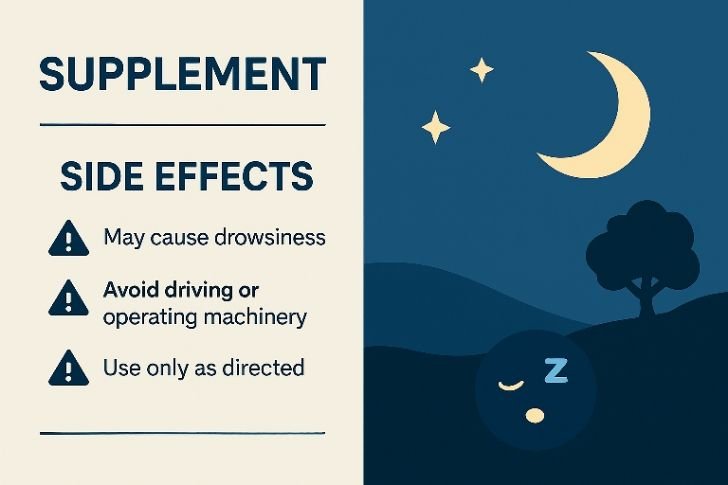
When it comes to Magnesium vs. Melatonin, knowing the side effects is important. Even if both is natural, that don’t mean they always safe for everyone or should be taken without knowing what could happen.
Let’s start with magnesium. It’s mostly safe and used by many people without problem. But taking too much magnesium can cause some tummy issues. Some peoples reported diarrhea or stomach pain, specially if it’s magnesium citrate type. That’s why it’s better to eat it with food, so it don’t upset your stomach much.
Another thing is that some magnesium supplements make people feel too relaxed, even during day. So it’s better to use it before bedtime only.
Now let’s talk about melatonin. This sleep hormone is good for short-term help, but it might cause weird dream or next-day grogginess in some people. People sometimes feel sleepy even after waking up, which not good if you need to work or drive.
Best advice is to begin with a very low dose like 0.3mg or 0.5mg. Many people think more is better, but high melatonin dose doesn’t make you sleep better, it only increase side effects.
So in this Magnesium vs. Melatonin comparison, magnesium has fewer side effects if used in right dose. Melatonin is okay too but not for long-term everyday use.
Final Verdict: Best Sleep Aid – Magnesium or Melatonin?
So after looking at all things, the final question still remain: Magnesium vs. Melatonin, which one really help better with your sleep? It’s not always a easy answer because it depends on what is your sleep problems.
If you want to improve sleep quality and feel more rested, magnesium might be the winner. It calm your brain, help muscles to chill, and reduce stress hormones like cortisol. That’s why many people who try magnesium say they wake up more fresh in morning.
But if your trouble is not staying asleep but falling asleep at beginning, then melatonin might be more helpful for you. It’s best when your schedule is messed up, like when you fly across time zones or work at night.
Let’s say it this way:
– Use magnesium for long-term support and overall better sleep health.
– Use melatonin for short-term help, like when you need to sleep early suddenly or fix your clock.
In most Magnesium vs. Melatonin comparisons, experts say magnesium give more complete benefits if you use it smart and consistent. Melatonin works fast, but don’t fix deep sleep issues for many people.
So what’s the better sleep aid? It’s probably not just one or the other. Many peoples combine both in a safe way to get best of both worlds. But always talk with a doctor first if you not sure what to use.
Internal Resources:
How to Start a Healthy Lifestyle
Daily Wellness Routine to Start Feeling Better Now
External References:
National Sleep Foundation
NIH Magnesium Info
Cleveland Clinic on Melatonin
Takeaway
The Magnesium vs. Melatonin question depends on your personal sleep problems. If you can’t fall asleep easy, melatonin might work. If your sleep feels not deep or restful, magnesium can help more. Don’t just pick random—know what your body needs.
